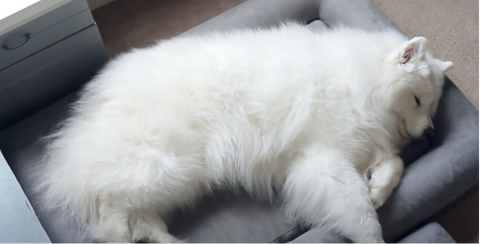How to Prevent Hip Dysplasia in Dogs?

Hip dysplasia can be prevented in some cases, but this condition has a lot to do with genetics and the development of your pup too.
To avoid development of hip dysplasia in dogs, you’ll first need a confirmed diagnosis from your veterinarian.
Typically identified with a physical exam of your dog’s hind legs and hip joint areas, followed by an x-ray, preventing further pain and damage to the joints is also essential.
This article will discuss when this condition can be prevented and how to minimize further pain, inflammation, and damage for your dog.
If you do think your dog might have a predisposition to dysplasia you should try an orthopedic dog bed and see if it helps them get comfy.
Diagnosis For Dogs With Hip Dysplasia
If you notice signs of dog hip dysplasia, such as bunny hopping, difficulty rising and sitting down, and swaying.
You should book a trip to take your dog to see a veterinarian.
To effectively avoid hip dysplasia in dogs from becoming a major problem, diagnosing the condition early is critical.
Often, pups as young as two months old will start to show symptoms of this progressive canine condition.
So if you have a new puppy, especially a large breed of dog such as a German Shepherd, watch out for these symptoms.
Your veterinarian will first assess your dog’s condition by gently moving their hind legs to see if their ball and socket hip joints are loose.
They’ll be looking for any grinding, pain, or reduced range of motion in your pup’s joints. After a physical exam, your veterinarian may request an x-ray to confirm the condition.
They may also ask about your dog’s medical history, symptoms, and any possible injuries.
Radiographs of your dog will determine whether they have this condition in their hips and to what degree.
NOTE - While some dog breeds are more predisposed to suffer from this hip joint condition it can occur in any dog breed from the canine population.

Preventing Further Pain For Dogs With Hip Dysplasia
A healthy lifestyle is a key to preventing this condition, and supporting your dog’s development needs to start as early as possible.A nutrient and vitamin-rich diet will give puppies of any size a head start for healthy bone and joint development and stop excessive growth and increased body weight, leading to hip dysplasia in dogs.
Learn How To Prevent Hip Dysplasia In Dogs & Care For Them
If you have bought a puppy and notice signs of hip dysplasia, you should inform the breeder, but your dog will still live a long and happy life.Supplement For Dogs With Hip Dysplasia
Preventing further damage to their joints involves natural supplements. Large breed dog food often contains glucosamine, a joint supplement.
Veterinarians often recommend treating hip dysplasia and being given to your pup in a chewable version.
Veterinarian grade glucosamine will be much stronger than what you typically find in dog food, and it’s going to improve your dog’s diet and condition.
Besides glucosamine, you can also upgrade meal times with early intervention supplements such as Glyde Mobility Chews.
These are often given to pups with hip dysplasia or arthritis and are safe for long-term use too. These powerful doggie superfoods will help reduce the symptoms of hip dysplasia and make your dog feel less pain and discomfort too.

Canine Hip Dysplasia Care
Your dog is probably feeling a little sorry for themselves at the moment so it’s time to shower them with love and affection.
Rather than try to overcompensate by giving them tasty bones and biscuits during the day, avoid piling on the pounds, and treat them to a new toy that doesn’t require running around too much.
Puzzles, learning commands and playing hide and seek are all great engaging ways to spend quality time together. After a couple of games, let your pooch relax in their very own memory foam dog bed.
Far better in terms of comfort and support for the stiff joints and hips, an orthopedic dog bed is the ultimate gift for a dog with canine hip dysplasia.
Watch them snuggle down on the extra thick mattress and enjoy an afternoon snooze in complete comfort.
Improve their overall quality of life and shop orthopedic dog beds online now.
Before you go if you are interested in canine hip problems you might want to read this article asking how long can a dog live with hip dysplasia or this one asking how to help a dog with hip dysplasia?
NOTE - If you have any serious health concerns about your dog and any potential hip joint issues, please take them to the vet for some professional advice.





